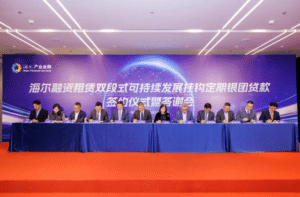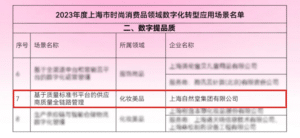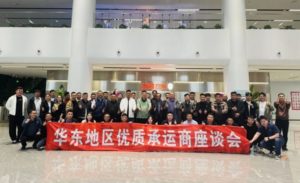The new normal under the registration system: many listed companies lock in mandatory delisting

[ad_1]
The annual report disclosure season is over, and a group of listed companies are about to withdraw their A-shares and “lock” their delisting ahead of schedule. The latest data shows that more than 20 companies have been “locked” for forced delisting, and with the addition of the six companies that have been delisted and delisted this year, there will be more than 30 companies that have been forced to delist this year, and this number is still increasing.
Industry experts said that with the implementation of the comprehensive registration system, the market’s function of survival of the fittest has further emerged, and a new pattern of normalized delisting of A shares has gradually formed and become more stable. Only when there is “in and out” in the market and the survival of the fittest is realized, can my country’s capital market realize the optimal allocation of resources and intertemporal pricing based on fair value.
Many companies “locked” forcible delisting
With the disclosure of the 2022 annual report coming to an end, a group of listed companies have also “locked” to delist ahead of schedule, and will soon withdraw from the A-share market.
On the evening of May 5, *ST Galaxy disclosed that the company’s stock may be terminated from listing after receiving the “Prior Notice” from the Shenzhen Stock Exchange. After the company’s audited net assets in 2021 were negative and the company’s financial report was issued an audit report that could not express an opinion, the company’s 2022 annual report showed that the audited company’s net assets were -1.253 billion yuan and the company’s 2022 financial report was negative. The accounting report was issued an audit report that could not express an opinion, which touched the termination of the listing of the stock. The company’s stock has been suspended from May 4, 2023.
It is worth noting that not only *ST Galaxy, but also *ST Blue Shield, *ST Qixin, and *ST Zhongdian also received the “Prior Notice” issued by the exchange on the same day, and the company’s stocks may be terminated from listing. , the company’s shares have also been suspended. Prior to this, *ST Shunli, *ST Bikang, *ST Shennan, *ST Yikang, *ST Future and many other companies have all received advance notice issued by the exchange to terminate the company’s stock listing.
According to the reporter’s incomplete statistics, as of the press release on May 7, there are currently more than 20 companies in the A-share market that are in the delisting process or have announced that they have touched the delisting index. There will be more than 30 delisted companies, and this number is still increasing.
“With the advancement of the comprehensive registration system, the market’s function of survival of the fittest has further emerged, and various delisting conditions have been clarified. Once a listed company touches one of them, it will face the risk of being delisted.” Chief Economist, Chuancai Securities, Chen Li, director of the institute, said.
Tian Lihui, dean of the Financial Development Research Institute of Nankai University, also told reporters that these companies were “locked” and forced to delist because of their own poor performance and touched one of the red lines of diversified delisting. “The construction of my country’s capital market not only ushers in a new era of registration-based issuance and listing, but also promotes a new pattern of ‘retirement and withdrawal’. Only when the market enters and exits, and the survival of the fittest can be realized, can my country’s capital market realize the optimal allocation of resources and intertemporal pricing based on fair value,” he said.
It is worth noting that from the perspective of market performance, investors are “voting with their feet” for delisting venture companies. On May 5, ST shares encountered a “limit-down wave”. As of the close of the day, 54 individual stocks in the Shanghai and Shenzhen stock markets fell by the limit, of which 47 belonged to the ST sector, most of which were “capped” due to financial report-related issues before and after the recent annual report disclosure ST shares.
The effectiveness of the normalized delisting reform continues to emerge
It is understood that since the implementation of the new delisting regulations for more than two years, the system has been continuously improved, the supervision has become more stringent, the channels have become smoother, and the power of the market-oriented, normalized and legalized delisting system has been continuously demonstrated. Since the beginning of this year, the characteristics of delisting diversification are particularly obvious, including transaction delisting, financial delisting and major illegal delisting, and other delisting cases continue to emerge.
Among the companies that have been “locked” for mandatory delisting, the proportion of financial delisting situations such as “deducting non-net profit + operating income” combined financial indicators and non-standard audit opinions is the highest. It is worth noting that, as the “gatekeepers” of the capital market, intermediaries such as audit institutions are more resolutely shouldering their responsibilities and becoming an important force in promoting normalized delisting. Non-standard opinions”, sounding the delisting alarm.
Trading delisting has become an important channel. Of the 6 companies that have been delisted in the Shanghai and Shenzhen stock markets since 2023, 4 companies are trading delisted. These companies have lost their ability to continue operating, and various risks are intertwined. Those who “vote with their feet” will be delisted. In addition, *ST Blu-ray has also been locked in advance for transaction delisting.
Major illegal delisting shows “zero tolerance”. On April 21, the China Securities Regulatory Commission delivered an administrative penalty decision to *ST Zeda and *ST Zijing, affirming that the two companies had major illegal activities such as fraudulent issuance, involving major illegal activities. delisting criteria. At present, the two companies have entered the suspension process, waiting for the exchange’s decision to terminate listing.
This is inseparable from strict and effective delisting supervision. On the one hand, the exchange strictly implements the delisting system and insists on “retirement should be done at all”. The reporter learned that in the delisting supervision work in 2023, the Shanghai Stock Exchange will strictly implement the delisting system and delisting supervision implementation plan. , Crack down on the business income behavior of surprise organizations such as new business income, tighten the responsibility of intermediary agencies, and effectively implement delisting supervision. On the other hand, the exchange urges risk warnings to prevent excessive speculation. In addition, the regulatory authorities have strengthened cooperation to ensure a smooth delisting. The reporter noticed that under the overall guidance of the China Securities Regulatory Commission, the Shanghai Stock Exchange maintains close communication with local securities regulatory bureaus and financial bureaus. Through various methods such as sending letters and visiting, the Shanghai Stock Exchange notifies information in a timely manner, unifies the handling ideas, forms a regulatory linkage, and jointly promotes delisting disposal.
“In and out” market-oriented ecology accelerates the formation
Experts in the industry said that with the full rollout of the registration system reform in my country’s capital market, the pattern of normalized delisting has become more stable, and a new market-oriented ecology of “in and out” and “survival of the fittest” is gradually being built.
“With the full implementation of the registration system in the capital market, the number of listed companies continues to increase, and market competition continues to intensify, the delisting of A shares will also present a new pattern of normalization.” In the capital market where all should be withdrawn, investors will carry out value investment, professional investment and long-term investment, and the market will also form a new ecology of resource optimization allocation, thereby promoting the healthy prosperity of my country’s capital market and the high-quality development of listed companies.
Chen Li also believes that with the continuous improvement of the delisting system, it has effectively prevented the previous trend of “speculating small and speculating poorly” and made the market ecology develop with higher quality. Listed companies will also pay more and more attention to market value maintenance and down-to-earth legal operations, and Focus on the main business and make longer-term strategic planning.
Dong Dengxin, director of the Finance and Securities Research Institute of Wuhan University of Science and Technology, said that after the full implementation of the registration system, IPOs will be more tolerant, and delisting efficiency will be higher, that is, “there are advances and retreats.” Listed companies are the main body and lifeline of the capital market. Their quality determines the investment value of the market. The market must be continuously purified. This is also the inevitable result of the market’s resource allocation function. He believes that the elimination rate of 1% in the A-share market is a bottom line requirement. The number of delisted companies each year should be 50 to 100, and it is not ruled out that there will be more than 100 companies in the future. The “one-yuan delisting” standard will become the mainstream delisting standard in the future, which is also the inevitable result of the reform of the registration system. “The normalization of delisting will make China’s stock market more dynamic, more quality, and more valuable for investment. This is also an important part of the two-way opening of my country’s capital market and increasing its attractiveness to international capital and foreign institutions.”
“‘Flowing water does not rot, household hinges do not worm’, normalized delisting, delisting is the ’empty shell zombie’ that cannot create value and the ‘black sheep’ that disrupts the market order, and it is solid that the listed companies in the capital market are increasing in both quality and quantity The backbone is the stable fundamentals of China’s economy that will continue to improve and go far. The comprehensive registration system has come, and the results of the delisting reform have been consolidated, and a normalized delisting mechanism has been on the way.” A person close to the regulator said to the reporter. .
[ad_2]
Source link







